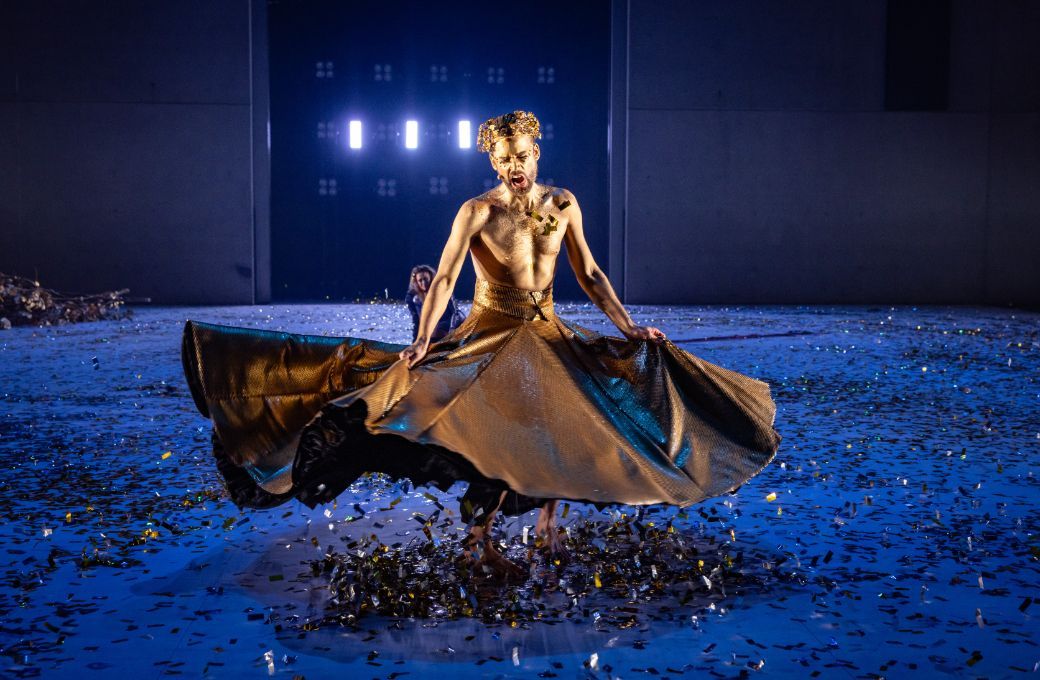In a press release, Artistic Director Jo Davies is quoted as saying, “Opera Australia is thrilled to be staging our first ever collaboration with both Sydney Chamber Opera and Carriageworks, and working with these incredible innovators. The future of opera in this country depends on Australian companies working together to produce new repertoire by homegrown creatives, expanding opportunities for local artists and finding new ways to engage contemporary audiences, and I believe Gilgamesh encapsulates all of this brilliantly. I eagerly await opening night”.

Sadly, by the time that came, Davies had fallen out with OA and decamped for the UK. But one legacy of her brief tenure has to be this production – created on a scale that the SCO could never have managed alone, involving a huge open stage, a set that includes a dismembered tree and 10,000 gold-painted leaves, 3D electronics (Benjamin Carey) to overcome a dead acoustic, two fabled instrumental groups and an audience that crossed boundaries between the two opera companies.
Yet it required only five singers – all so familiar to composer/conductor Jack Symonds that they claimed each part fitted like a glove. Mind you, the libretto tells mezzo Jessica O’Donoghue that she’s to sing Shahad, a Person of Uruk, Scorpion 2, and Uta-Napishti!
Not exactly familiar characters like Carmen or Mimì. But perhaps they should be. For The Epic of Gilgamesh is the Ur-myth of mankind. Recorded in 2700 BCE in the Akkadian language, it infected the Bible, Greek mythology and Jewish folklore despite being lost in its physical form on clay tablets from about 600 BCE until the 19th century. Amazingly, in the 20th century it was hailed both in The Columbia Anthology of Gay Literature as the earliest work of that genre and by feminist literary critics as evidence of the transition from the original matriarchy to our modern patriarchy.
Jack Symonds and Louis Garrick chose the former reading as the tyrant Gilgamesh (Jeremy Kleeman) falls for the once-animal Enkidu (Mitchell Riley) who was actually created from clay by the goddess Ishtar (Jane Sheldon) to tame the king’s tyranny. They also throw in an eco-reading after the boys have combined to defeat Humbaba, a three-headed, three-voice monster (Daniel Szesiong Todd), to cut down a sacred cedar forest. At the very end, a naked Gilgamesh recovers his humanity by embracing a tree seedling.
Earlier, it’s a corruption by humanity that has lead Enkidu from his mission, tempted by Ishtar’s prostitute/priestess (O’Donoghue) with wine and six days of uninterrupted sex – for which he’s ultimately condemned to die by the gods. But not even they are above temptation. For when Ishtar’s attempt to seduce Gilgamesh – she is the god of love and war – is rebuffed by him, Sheldon’s meltdown with the assistance of her patented ‘Janewail’, was a searing performance matched by the combined forces of the ASQ and Ensemble Offspring and director Kip Williams conjuring of a Gazan inferno on stage.
Meanwhile, Symonds’ unique chance to compose love-songs for two baritones was mildly undermined by asking wildman Enkidu to jump into falsetto so often. But there’s no denying that his dying and descent into Kish – the Mesopotamian hell – accompanied by a quietly agonised string quartet and Gilgamesh’s endeavours to hold him to life, was as moving as any consumptive heroine’s passing.
An uncompromising night in the theatre. Was there more music from the band than needed – re-purposing compositions that Symonds had written earlier for both ensembles? Or did the strangeness of such a storied culture justify every note, especially those enunciated so superbly by the singers?


